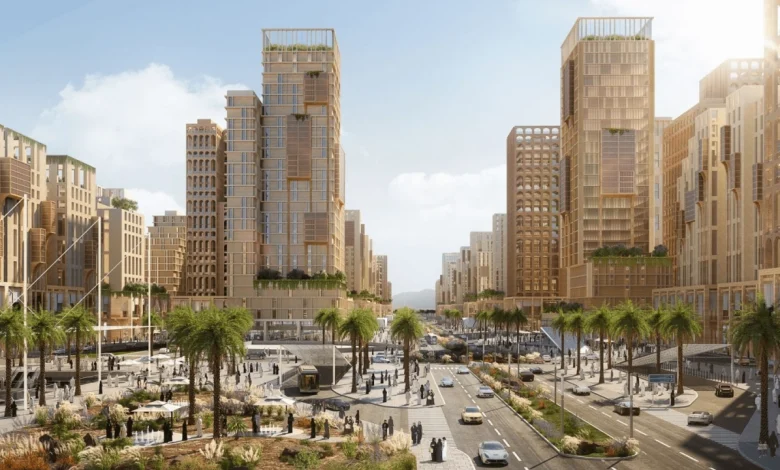
Global Investors Eye Saudi Market After New Property Rules
Saudi Arabia will let foreigners buy property starting January 2026, making a fundamental change to the Kingdom’s property rules. Non-Saudis can soon own real estate in specific areas of the country. This move is part of Saudi Arabia’s Vision 2030 plan to broaden its economy beyond oil and make it more appealing to investors.
The real estate sector has grown remarkably. Its share in the national economy jumped from 5.9 percent in 2023 to about 12 percent in 2024. Foreign buyers will soon be able to purchase properties in selected parts of Riyadh and Jeddah. The Real Estate General Authority will identify and regulate all areas open to foreign ownership. This new investment framework will boost housing supply, draw global investors and developers, and bring more foreign direct investment to Saudi markets. The Kingdom’s new residential mortgages value also went up by 17 percent year-on-year in 2024, showing the sector’s rising strength.
Saudi Arabia approves foreign property ownership law
Image Source: Economy Middle East
Saudi Arabia’s Cabinet made a landmark decision on July 8 to allow non-Saudis to own property in specific areas of the Kingdom. Crown Prince and Prime Minister Mohammed bin Salman chaired the session that approved this legislation. The new property ownership law will radically alter Saudi Arabia’s real estate sector and investment landscape.
Law takes effect in January 2026
January 2026 marks the official start date for this legislation after its formal publication in the official Umm Al Qura Gazette. This timeline gives authorities enough time to set up regulatory frameworks. Saudi government officials will release a detailed list of rules and permitted property ownership locations during this period. Potential investors can prepare to enter the market while domestic stakeholders adapt to the predicted changes.
Cabinet approval and Vision 2030 alignment
Real Estate General Authority’s Chairman and Minister of Municipal and Rural Affairs and Housing, Majed Al Hogail, praised the leadership’s approval of the updated legislation. This law extends ongoing reforms that develop the real estate sector and attract foreign direct investment. The property ownership reform arranges with Saudi Vision 2030’s goal to vary the Kingdom’s economy beyond oil and establish it as a global investment powerhouse.
Non-Saudis can own property in specific geographic areas, mainly in Riyadh and Jeddah. Makkah and Madinah’s ownership rules will have special conditions because of their religious significance. These measures create a balance between investment opportunities and national and cultural considerations.
Public consultation via Istitlaa platform
The Real Estate General Authority plans to suggest zones where non-Saudis may own property or acquire property rights. Officials will publish executive regulations on the Istitlaa public consultation platform within 180 days of the law’s publication. Saudi Arabia shows its steadfast dedication to transparent policymaking through this initiative. Citizens and potential investors can provide feedback and suggestions before the final regulations become official, which helps shape the implementation details effectively.
Government defines zones for foreign ownership
Image Source: LinkedIn
Saudi Arabia has mapped out clear geographic boundaries for its new foreign ownership policy. Starting 2026, non-Saudis can invest in real estate within specific zones. This strategic zoning helps balance economic growth with cultural values and national security concerns.
Can foreigners buy property in Jeddah and Riyadh?
The new law allows non-Saudi nationals to purchase property in designated areas. Riyadh and Jeddah stand out as the main markets open to foreign buyers. These cities serve as Saudi Arabia’s commercial and economic centers that offer great growth potential for real estate investments. The Real Estate General Authority will soon define the exact boundaries where foreigners can buy property in these cities through upcoming regulations.
Special conditions for Mecca and Medina
Mecca and Medina’s profound religious importance means they face stricter controls compared to other Saudi cities. In spite of that, the new law doesn’t completely block foreign participation in these holy cities’ real estate markets. The law allows ownership under “special requirements”. Right now, non-Saudis can only own property in Mecca and Medina through inheritance. Non-Saudi Muslims have the option to lease property in these cities with renewable two-year terms. These rules help protect the sanctity of these cities and ensure they remain accessible to pilgrims worldwide.
How the Real Estate General Authority will regulate zones
The Real Estate General Authority (REGA) will define all geographic areas where foreigners can own property. REGA has 180 days from the law’s publication in the official gazette to prepare complete executive regulations. These regulations will cover:
- Application processes for property purchases
- Eligibility criteria for foreign buyers
- Enforcement mechanisms to ensure compliance
- Safeguards to protect Saudi citizens’ interests
Stakeholders can provide feedback on this regulatory framework through the Istitlaa platform before implementation. This open approach shows Saudi Arabia’s dedication to creating a balanced policy that welcomes foreign investment while keeping appropriate controls in place.
New law aims to boost Saudi Arabia foreign investment
Image Source: worldestate.homes
Saudi Arabia’s property sector has become the life-blood of its economic transformation strategy. The Kingdom wants to position its real estate market as a catalyst for broader investment goals when foreign ownership laws come into effect in 2026.
Why the property real estate sector is key to diversification
The property real estate sector has grown faster as a vital part of Saudi Arabia’s non-oil economy. Its contribution almost doubled from 5.9 percent in 2023 to about 12 percent in 2024. This growth shows the sector’s strategic value to Vision 2030 objectives. The government has rolled out over 20 new real estate-related rules to streamline regulations and improve investor confidence. The property market helps expand tourism, commercial infrastructure, and urban development—key elements that reduce oil dependency. The residential real estate sector has grown at a 4.5 percent compound annual rate since 2017 and experts project it will double by 2028.
How the law supports housing supply and urban development
The new foreign ownership legislation wants to boost real estate supply by drawing international investors and developers. Global capital access should help speed up housing development throughout the Kingdom. The law also supports ongoing urban development projects worth AED 3.89 trillion under construction. Market readiness shows in the surge of project activity. Authorities gave out 192 new real estate project licenses and 3,800 construction permits in 2024. This represents a 59 percent increase in the fourth quarter alone. Last year also saw more than 130 foreign real estate investment licenses issued, which points to growing international interest.
Comparison with Dubai and other Gulf models
Saudi Arabia follows strategies that worked well for neighboring Gulf states. Dubai’s property market took off after opening to foreigners in 2002. This made Dubai one of the world’s top spots for global property investors. Abu Dhabi and Doha have also pulled in billions through their foreign ownership zones. Saudi Arabia stands out from these 20-year old markets through massive government-backed projects like NEOM, the Red Sea Project, and Al Qiddiya. The Kingdom plans to build on these successful models. Its larger population and economic scale could create even bigger investment opportunities.
Real estate market reacts to policy shift
Image Source: Construction Week Online
Saudi Arabia’s property sector shows strong market enthusiasm for the new foreign ownership policy. Developers and investors are already preparing for the expected boom, even though implementation will start in more than a year.
Saudi Arabia real estate project licenses surge
Development activity growth throughout 2024 shows the concrete effects of property reforms. Saudi authorities issued 192 new real estate project licenses worth 147 billion riyals (AED 143.21 billion). Project approvals accelerated rapidly with 3,800 construction permits—a 59 percent increase in the fourth quarter alone. Global investors have shown increased interest as authorities issued over 1,130 licenses for foreign real estate investments during the third quarter of 2024[184]. This growth shows stronger confidence from global investors who await the market’s complete opening in 2026.
Residential and commercial prices on the rise
The policy transformation has pushed property prices higher across Saudi Arabia. The General Authority for Statistics reports the Real Estate Price Index grew 2.6 percent in Q3 2024 compared to the previous year. Residential property values went up by 1.6 percent. Apartment prices increased 1.9 percent while villa prices grew 1.5 percent. Commercial sector showed stronger performance with prices rising 6.4 percent. Commercial land values grew 6.3 percent and building prices surged 8.6 percent. Riyadh leads regional growth at 10.7 percent, with Makkah following at 1.5 percent. Office space has become particularly profitable. Riyadh’s rental rates increased 18 percent year-over-year, and Jeddah and Dammam experienced 10-12 percent growth.
Investor sentiment and stock market response
The ownership law announcement sparked a rally in Saudi real estate stocks. This reflects positive market outlook toward the sector’s future. The property sector has become a key economic driver, contributing 12 percent to GDP in 2024. It achieved the highest labor market participation with 25 percent of social insurance system participants. The National Investment Strategy predicts foreign direct investment will reach SAR 388 billion by 2030. The real estate sector stands to attract much of these investments as regulatory restrictions continue to decrease.
Saudi Arabia’s bold move to open its property market to foreign investors marks a turning point in the Kingdom’s economic progress. This change arranges well with Vision 2030 goals and helps tackle housing supply challenges. Starting January 2026, foreign investment will revolutionize Saudi’s real estate map, especially in key zones across Riyadh and Jeddah.
The property sector’s growth shows the market is ready for international players. Its economic contribution has almost doubled from 5.9 percent to 12 percent. The market’s health shines through increased project licenses, construction permits, and rising property values across the Kingdom. On top of that, the rush for foreign investment licenses proves strong international interest even before the rules take effect.
The Real Estate General Authority will balance economic openness with cultural preservation through careful oversight. This matters most when dealing with sacred cities like Mecca and Medina. Their measured approach welcomes global capital while protecting Saudi’s heritage. The Istitlaa platform’s public consultation process adds transparency as final regulations take shape.
Saudi Arabia takes cues from its Gulf neighbors’ success stories but operates on a much larger scale. The Kingdom’s massive government-backed development projects will without doubt draw substantial foreign interest. This complete reform could help Saudi Arabia outpace regional rivals as the top investment spot.
The real estate market has responded with enthusiasm to these upcoming changes. Property prices have climbed in both residential and commercial sectors, particularly in Riyadh. This reflects growing confidence among local and international stakeholders. Stock market reactions also point to positive investor expectations.
Saudi Arabia now stands ready to enter a new chapter in its property market story. These reforms will propel economic diversification and create opportunities for Saudi citizens and global investors alike. The road to 2026 promises steady growth as the Kingdom turns its real estate sector into the life-blood of its post-oil economy.






